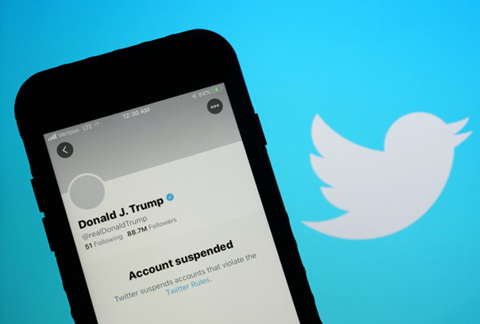Why Big Tech Stands to Benefit from New Scrutiny
All of President Trump’s social media accounts have been suspended, creating a firestorm over the role of big tech in public discourse.
But as the controversy intensifies, investors should see a buying opportunity in the works.
On Thursday, managers at Twitter, Inc. (NYSE: TWTR) permanently banned the president. And within days, the social platform Parler, his likely destination, was pulled from the Android and Apple, Inc. (Nasdaq: APPL) stores.
Conservatives are crying foul … but investors are expecting higher big tech stock prices.
To be clear, the stakes have changed following Wednesday’s deadly siege in Washington, D.C. when an angry mob descended on Capitol Hill to disrupt the ceremonial counting of electoral college votes. Rioters were misled to believe they could change the outcome of the presidential election.
Source: New York Post
This disinformation spread easily on the big social-media platforms like Facebook, Inc. (Nasdaq: FB), YouTube and Twitter, where much of the most egregious user-generated content easily slipped past moderation.
A consensus quickly formed that President Trump incited the mob. Big tech social media chieftains moved swiftly to stifle his reach. By Sunday, Axios reported that the President lost privileges to post content on Twitter, Facebook, YouTube, Instagram, Snapchat, Pinterest Inc. (NYSE: PINS) and Shopify Inc. (NYSE: SHOP), an ecommerce platform.
The bans even extended to smaller instant messaging and online community building platforms like TikTok, Reddit and Discord.
Related Post: Buy … Don’t Fear Big Tech Weakness
And if the president thought he could flee to Parler, a platform known for its lax oversight of user content, Apple and Google put an end to that idea by pulling the app from their stores.
A New York Times headline said it best: “Parler Pitched Itself as Twitter Without Rules. Not Anymore, Apple and Google said.”
Conservatives are calling this censorship. And in the past, these same voices have threatened big tech firms with the repeal of Section 230, legislation that absolves tech platforms from legal liability stemming from user content.
The argument is simple: If tech companies behave like publishers and censor content, they forfeit their right to legal immunity.
It’s a good argument. In a different time it might gain traction. However, public opinion is swinging toward safety. A new Democratic majority in the Senate is likely to fall on the side of greater regulation and stricter standards for what gets posted online.
But from an investment standpoint … the events that occurred last Wednesday will have a dramatic impact for big tech that could change everything in the future.
And larger, well established tech platforms have a distinct advantage.
Moderating content, especially without scale, will be costly. It will deprive smaller firms of marketing funds needed to build user and revenue growth. Without these metrics ticking higher, it will be impossible to attract investor capital.
Alphabet Inc. (Nasdaq: GOOGL), the parent of Google, is in the best position to take advantage. The Mountain View, Calif.-based conglomerate is home to YouTube, a valuable social-media platform that is continually overlooked by investors.
With 2 billion monthly active users, YouTube is the second largest social media platform behind Facebook. Next to Google, its parent company, YouTube is also the second most popular search engine. And the platform is sticky, too.
According to a report from Hootsuite, a social media marketing platform, YouTube is the second most preferred platform for watching video content on television. Netflix, Inc. (Nasdaq: NFLX) is first.
Related Post: Tech Antitrust Effort Will Destroy Trust, Not Tech
Investors rarely think about YouTube in terms of social, search and TV … yet the business is a solid number two in each category. Variety noted that YouTube members watched a staggering 250 million hours every day on their smart TVs through March 2019, an increase of 39% year-over-year.
That business is valuable. It’s also in a good position to be spun out as a standalone firm thanks to a 2015 corporate reorganization at Alphabet. YouTube has an independent board of directors, the ability to self-finance and recognized brand.
There will be some near-term fallout from banning President Trump. Investors may even sell big-tech shares first and ask logical questions later. But with that in mind, longer-term investors should recognize the incredible opportunity.
Greater regulation reduces the likelihood of disruption … and breaking up big tech is ultimately bullish because it unlocks valuable assets, like YouTube.
Savvy investors should jump on these incredible opportunities when they arise.
Best wishes,
Jon D. Markman




